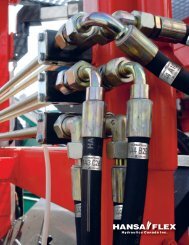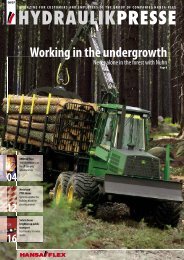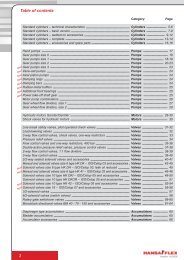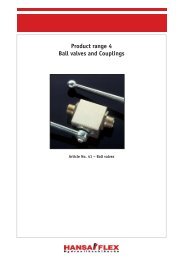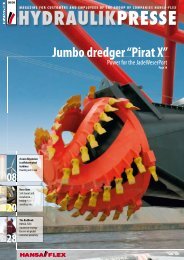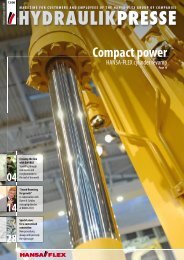hydraulik - HANSA-FLEX Hydraulics Canada Inc.
hydraulik - HANSA-FLEX Hydraulics Canada Inc.
hydraulik - HANSA-FLEX Hydraulics Canada Inc.
Create successful ePaper yourself
Turn your PDF publications into a flip-book with our unique Google optimized e-Paper software.
HYDRAULIKPRESSE<br />
BVV – BOCHUMER VEREIN VERKEHRSTECHNIK<br />
Precision wheels from the coalfields<br />
Baptism of fire<br />
Keeping things rolling<br />
Various production systems were not routinely<br />
overhauled until the end of the year. Entire production<br />
units underwent a thorough overhaul. This<br />
extensive work calls for careful planning every time<br />
- after all, the manufacturing equipment needs to<br />
go back into production on schedule without any<br />
delay.<br />
High-speed trains race along the track at 250 km an<br />
hour. This puts wheels under enormous strain, calling<br />
for maximum reliability. The precision wheels manufactured<br />
by Bochumer Verein Verkehrstechnik (BVV)<br />
for the German and international railway companies<br />
are designed to provide top levels of accuracy and reliability.<br />
This means they are correspondingly dear to<br />
manufacture.<br />
In the historic-looking factory buildings based in<br />
the heart of the coalmining town of Bochum 580<br />
employees use high-tech machinery to produce<br />
some 120,000 locomotive wheels in various configurations,<br />
operating round the clock, seven days<br />
a week. This medium-sized company belonging to<br />
the Georgsmarienhütte Group of Companies has<br />
operated in the steel casting sector since 1841.<br />
Such precision wheels literally go through a baptism<br />
of fire as the special steel, which is alloyed to cope<br />
with the stresses imposed on locomotive wheels, is<br />
heated to a temperature of around 1300 degrees C.<br />
The red-hot block of steel is forged into shape using<br />
a special press with a force of 6,000 t.<br />
Locomotive wheels are made of a single piece of<br />
metal for safety reasons as weld seams are unable<br />
to meet the necessary standards. The red-hot blank<br />
for the wheel, which has been previously sawn into<br />
shape, is processed using a forging press and then<br />
calibrated in subsequent work steps on a 2,000<br />
t press. Next the outer contours of the wheel are<br />
checked by measurement with a laser.<br />
Next comes fine machining, a challenging task that<br />
is performed by robots and high-performance precision<br />
machines at CNC machining centres. At the<br />
end of the production process are wheels which will<br />
run 100% true, down to a hundredth of a millimetre,<br />
and are designed to ensure reliable operation in<br />
heavy-duty rail traffic whatever the weather.<br />
In the planning phase the Repairs, Maintenance<br />
and Service department first of all works out the<br />
level of reconditioning and/or replacement work<br />
required for each machine. This phase also identifies<br />
any leakage. The behaviour of the machines during<br />
production provides pointers about measures that<br />
might be necessary. Such information allows the<br />
company to draw up exact plans for the overhaul<br />
and order all spare parts needed in good time. Surprises<br />
may however still be in store. When panelling<br />
is removed from the machinery, this may reveal<br />
damage and defects that were previously hidden,<br />
such as a leaking hydraulic cylinder or even a unit<br />
with reduced capacity levels. If this is the case, specialists<br />
and technicians from external companies<br />
will have to be called in to help the maintenance<br />
team with the overhaul. The only thing that is certain<br />
in this process is the end date for the service:<br />
that’s definite!<br />
To make sure its machinery and systems are always<br />
ready for operation, BVV involves the service staff<br />
of the machine manufacturers not only in the overhaul<br />
but also in the servicing process. They are of<br />
course familiar with all technical issues relating to<br />
their machines. Here <strong>HANSA</strong>-<strong>FLEX</strong>’s Bochum branch<br />
acts as the specialist for hydraulic hose lines and<br />
repair of the line engineering as a high level of hydraulics<br />
is involved in the forging and rolling mills.<br />
<strong>HANSA</strong>-<strong>FLEX</strong> is also increasingly accepting work<br />
from plant manufacturers when it is a question of<br />
line engineering and services. All services involving<br />
hydraulics are coordinated by Christoph Bergfried<br />
from the Bochum branch - and not just when overhauling<br />
is underway.<br />
16<br />
HYDRAULIKPRESSE<br />
ISSUE APRIL 2008



